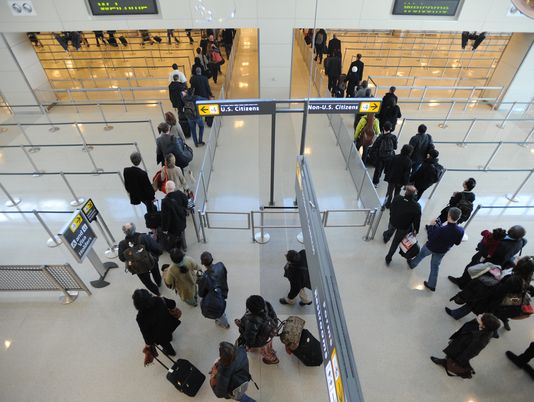Foreign travelers say they'll avoid U.S., survey says
WASHINGTON — Overseas travelers say they'll avoid the United States because of long wait times and inefficient entry procedures at gateway airports — and recommend to others that they too stay away, a new survey of foreign visitors out Tuesday indicates.
Forty-three percent of travelers who had traveled to the United States say they'll tell other countrymen and women not to visit because of the cumbersome entry process, according to the survey of 1,200 travelers from Britain, France, Germany, Japan, China and Brazil.
The survey was taken from January through October of last year by the Consensus Research Group for the U.S. Travel Association, which represents the travel industry and lobbies for its issues.
Among the complaints:
- One in three travelers said the U.S. was falling behind other countries or it was the worst they had ever experienced in terms of getting through U.S. Customs and Border Protection procedures.
- Business travelers, especially, said they were put off by the entry process, with 44% saying they will refuse to visit in the next five years.
- One in seven international travelers said they had missed a connection because of delays at Customs. Two-thirds said they would consider the U.S. an attractive destination if the Customs lines and wait times were shorter.
Upon entering the United States, foreign visitors often wait in long lines to get their passports inspected and to declare any goods they are carrying with them. Often, they have to get their bags inspected by Customs and Border Protection officers looking for any illegal or dangerous items, such as drugs or certain foods.
Wait times vary depending on the airport, but some travelers said they've been stuck for up to two or three hours.
"Not only are people saying bad things about us, but they're actually changing their travel behavior," says Bob Perkins, president of Consensus Research Group.
The amount of visitors to the U.S. from countries can vary from year to year, depending on the economic conditions in their home country or whether they have to get visas to visit the U.S., even as vacationers.
The number of visitors from European countries where travelers were surveyed — France, Germany and Britain — has dropped, according to U.S. Commerce Department tabulations. From October 2011 to October 2012, there was a 17% decrease in visitors from France to 119,871, a 7% decrease in visitors from Germany to 188,238, and a 5% decrease in visitors from Britain to 375,775. And citizens of those nations don't need visas to visit the U.S.
The number of travelers from China and Brazil has risen, although they need visas to visit. There was a 24% increase in visitors from China to 110,012 during that time and a 12% increase in visitors from Brazil to 162,119. The State Department has been speeding up the process for the Chinese and Brazilians to get visas over the last year.
The number of visitors from Japan also was up 13% to 311,874 from October 2011 to October 2012, according to Commerce Department figures. The Japanese also don't need visas.
Jenny Burke, a spokeswoman for Customs, says that the number of international visitors has increased since 2003 and that Customs has been trying to expedite entry lines through trusted traveler programs for frequent travelers who have been pre-screened.
She says recent mandatory budget cuts, including planned furloughs, will increase wait times for international arrivals, but that the agency "is working to minimize impacts to travelers to the greatest degree possible while maintaining the highest standards of security."
The survey indicates that many visitors who've come to the USA are telling others not to because of entry times.
On average, the survey says, each tells eight others about his or her travel experience either through word of mouth or social media. That could translate into 100 million overseas travelers getting the message that the United States is too difficult to get into.
Roger Dow, president of the U.S. Travel Association, says that such sentiments could have a significant impact on the U.S. economy. The travel industry has added 351,000 jobs since 2010, he says. If 100 million travelers decide not to visit, that could cost the economy at least $95 billion and 518,000 jobs, the association estimates.
"When international visitors come to us, especially from overseas, they stay longer and spend more money than domestic travelers," he says. "We're putting the industry and economy at risk by not addressing long lines."
The survey was taken before federal budget cuts began taking effect this month, which can exacerbate the delays.
Homeland Security Secretary Janet Napolitano has said that the mandatory budget cuts have already increased wait times at several major airports across the country because of the elimination of overtime for Transportation Security Administration and Customs officers.
"It's likely to get worse before it gets better," says Geoff Freeman, chief operating officer and executive vice president of the travel association.
The travel association says it is calling on Congress and President Obama's administration to provide more resources to Customs. Just adding 1,000 additional Customs officers at a cost of about $150 million could decrease wait times to 30 minutes or less, which should be the standard, Freeman says.
Freeman says telling travelers estimated wait times at all points through the entry process would also ease tensions. And hiring non-law enforcement personnel to perform administrative tasks would free up officers to perform their most sensitive security duties, he says.
"What the research tells us is, simply put, we're leaving money on the table," Freeman says. "The economic consequences are staggering and leave us no choice but to address these issues."










